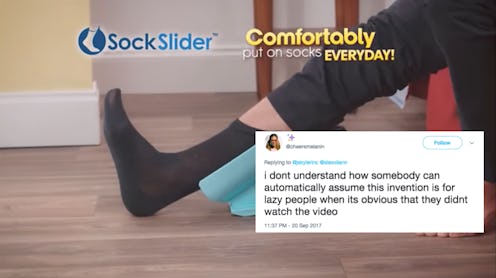Life
This One Tweet Shows Why As-Seen-On-TV Products Are Actually Really Useful For Disabled People
One of the very, very few issues with a late-night Netflix binge sesh is that you miss out on late-night TV infomercials. You know the kind: They usually feature delightfully retro music, egregious overacting, and products that you think couldn’t possibly be useful to anyone, until you realize that they are, indeed, very useful to one community in particular. A tweet by Twitter user @jskylerinc brilliantly called out people who make fun of these products, showing that for disabled people, as-seen-on-TV products can make life so much easier, and drastically improve their quality of life.
The tweet, posted on Sept. 20, was posted in response to another tweet criticizing a commercial for a product called the “Sock Slider.” The first tweet reads, “Just saw an ad for something called a ‘sock slider’ and my initial thought was ‘if you don't pull yo gotdamn sock up like everybody else..’” [sic], with a link to the infomercial in question. (The Sock Slider makes it easier to put on and take off socks for people with low mobility, and the infomercial features people with low mobility and chronic pain who have benefitted from it.) J. Skyler quote-tweeted the original tweet, adding that the Sock Slider is “marketed SPECIFICALLY to disabled people IN THIS VIDEO CLIP.”
Their tweet perfectly sums up the main problem with the typical response to these videos, which is primarily to laugh at the “lazy” people who might actually buy the products featured. (Remember our collective meltdown over the Snuggie in 2012?) Many of these products, even if they’re not marketed specifically to disabled people, are incredibly helpful for people with disabilities, whether they have chronic pain, low mobility, tremors, or other conditions that non-disabled people are rarely asked to think about.
J. Skyler goes on to point out how these infomercials tend to feature non-disabled actors (though, crucially, not in the case of the Sock Slider) because the marketers need to get the attention of non-disabled viewers. “They literally have *30 seconds* to convince you this new-doohickey will dramatically improve your life while anticipating your skepticism […] Ergo they purposefully over exaggerate EVERY conceivable inconvenience the product could potentially solve JUST TO GET YOUR *CONSIDERATION*,” J. Skyler continues in their thread. Non-disabled people don’t often have to put themselves in disabled people’s shoes and consider their functional needs — so instead, these companies show hyper-clumsy non-disabled people whose lives are bettered by these devices to demonstrate how their products could be useful for everyone.
Think about it: LifeAlert. The EZ Cracker. The Touch & Brush. These are all products that make life easier for older people, or people who can only use one arm, or who have limitations on their fine motor skills. Though not all of these infomercial-style products are specifically made for disabled people — even the Snuggie, which many people think was invented for wheelchair users, was not — many of them have the capacity to seriously improve life for people living with disabilities (and non-disabled people alike).
Sadly, if you search “Sock Slider” on Twitter, you get a lot of people cracking the same jokes that’ve been made about other as-seen-on-TV products in the past, despite the fact that it is explicitly marketed to people with disabilities. This shows how awareness of disabilities — especially of invisible disabilities, like chronic pain — needs to extend to the mainstream. Yes, these infomercials are corny, and no, not all these products will be useful for everyone, but reacting to them with a little bit of empathy goes a long way towards realizing how they can actually be useful after all.
